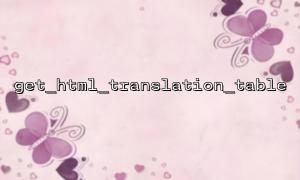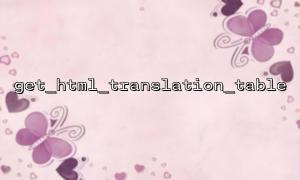In PHP, character escaping is a common task, especially when handling user input or displaying dynamic content. htmlentities and get_html_translation_table are two widely used PHP functions. They are used to convert characters into HTML entities and to retrieve the HTML entity translation table, respectively. Proper use of these functions can achieve more precise character escaping, prevent potential security risks, and ensure the correctness and safety of your website.
The htmlentities function converts characters in a string to their corresponding HTML entities. It is mainly used to prevent cross-site scripting (XSS) and other HTML injection attacks. By converting special characters (such as <, >, &, etc.) into HTML entities, htmlentities ensures that these characters are rendered correctly in the browser.
<span><span><span class="hljs-variable">$string</span></span><span> = </span><span><span class="hljs-string">"<div>Some text</div>"</span></span><span>;
</span><span><span class="hljs-variable">$escaped_string</span></span><span> = </span><span><span class="hljs-title function_ invoke__">htmlentities</span></span><span>(</span><span><span class="hljs-variable">$string</span></span><span>, ENT_QUOTES, </span><span><span class="hljs-string">'UTF-8'</span></span><span>);
</span><span><span class="hljs-keyword">echo</span></span><span> </span><span><span class="hljs-variable">$escaped_string</span></span><span>; </span><span><span class="hljs-comment">// Output: &lt;div&gt;Some text&lt;/div&gt;</span></span><span>
</span></span>In the example above, htmlentities converts the HTML tags
The get_html_translation_table function returns a translation table containing all HTML special characters and their corresponding entities. This table underlies the htmlentities and htmlspecialchars functions. With this table, you can customize character escaping or manually retrieve the entity corresponding to certain characters.
<span><span><span class="hljs-variable">$translation_table</span></span><span> = </span><span><span class="hljs-title function_ invoke__">get_html_translation_table</span></span><span>(HTML_ENTITIES, ENT_QUOTES, </span><span><span class="hljs-string">'UTF-8'</span></span><span>);
</span><span><span class="hljs-title function_ invoke__">print_r</span></span><span>(</span><span><span class="hljs-variable">$translation_table</span></span><span>);
</span></span>This function returns an associative array where the keys are characters and the values are their corresponding HTML entities. For example, it may return a structure like this:
<span><span><span class="hljs-title function_ invoke__">Array</span></span><span>
(
[<] => &lt;
[>] => &gt;
[&] => &amp;
[<span class="hljs-string">"] => &quot;
['] => &#039;
...
)
</span></span></span>Although htmlentities can handle most character escaping tasks, sometimes finer control is needed, especially for specific characters. In these cases, combining get_html_translation_table allows for more precise and flexible escaping.
If you want to escape certain characters in HTML entities according to custom rules, rather than using the standard htmlentities behavior, you can first get the standard translation table with get_html_translation_table and then modify it to suit your needs.
<span><span><span class="hljs-comment">// Get the standard HTML entity translation table</span></span><span>
</span><span><span class="hljs-variable">$translation_table</span></span><span> = </span><span><span class="hljs-title function_ invoke__">get_html_translation_table</span></span><span>(HTML_ENTITIES, ENT_QUOTES, </span><span><span class="hljs-string">'UTF-8'</span></span><span>);
</span><span><span class="hljs-comment">// Modify the escaping of certain characters in the table</span></span><span>
</span><span><span class="hljs-variable">$translation_table</span></span><span>[</span><span><span class="hljs-string">'<'</span></span><span>] = </span><span><span class="hljs-string">'&lt;'</span></span><span>; </span><span><span class="hljs-comment">// Default behavior</span></span><span>
</span><span><span class="hljs-variable">$translation_table</span></span><span>[</span><span><span class="hljs-string">'&'</span></span><span>] = </span><span><span class="hljs-string">'&amp;'</span></span><span>; </span><span><span class="hljs-comment">// For example, we still keep the '&' escaping</span></span><span>
</span><span><span class="hljs-comment">// Customize escaping for other characters</span></span><span>
</span><span><span class="hljs-variable">$translation_table</span></span><span>[</span><span><span class="hljs-string">'*'</span></span><span>] = </span><span><span class="hljs-string">'&ast;'</span></span><span>; </span><span><span class="hljs-comment">// Escape '*' as '&ast;'</span></span><span>
</span><span><span class="hljs-comment">// Apply the modified table to a string</span></span><span>
</span><span><span class="hljs-variable">$string</span></span><span> = </span><span><span class="hljs-string">"Hello * World!"</span></span><span>;
</span><span><span class="hljs-variable">$escaped_string</span></span><span> = </span><span><span class="hljs-title function_ invoke__">strtr</span></span><span>(</span><span><span class="hljs-variable">$string</span></span><span>, </span><span><span class="hljs-variable">$translation_table</span></span><span>);
</span><span><span class="hljs-keyword">echo</span></span><span> </span><span><span class="hljs-variable">$escaped_string</span></span><span>; </span><span><span class="hljs-comment">// Output: Hello &ast; World!</span></span><span>
</span></span>This method allows you to flexibly control which characters need to be escaped and which should remain unchanged.
If you only want to escape certain characters while leaving others unchanged, you can combine htmlentities and get_html_translation_table to achieve this. For instance, you may only want to escape &, <, and >, leaving other characters intact.
<span><span><span class="hljs-variable">$string</span></span><span> = </span><span><span class="hljs-string">"This is a <div> & 'text' with some special characters."</span></span><span>;
</span><span><span class="hljs-variable">$translation_table</span></span><span> = </span><span><span class="hljs-title function_ invoke__">get_html_translation_table</span></span><span>(HTML_ENTITIES, ENT_NOQUOTES, </span><span><span class="hljs-string">'UTF-8'</span></span><span>);
</span><span><span class="hljs-comment">// Only escape <, >, and & symbols</span></span><span>
</span><span><span class="hljs-variable">$escaped_string</span></span><span> = </span><span><span class="hljs-title function_ invoke__">strtr</span></span><span>(</span><span><span class="hljs-variable">$string</span></span><span>, </span><span><span class="hljs-variable">$translation_table</span></span><span>);
</span><span><span class="hljs-keyword">echo</span></span><span> </span><span><span class="hljs-variable">$escaped_string</span></span><span>; </span><span><span class="hljs-comment">// Output: This is a &lt;div&gt; &amp; 'text' with some special characters.</span></span><span>
</span></span>By properly combining htmlentities and get_html_translation_table, PHP developers can achieve more flexible and precise character escaping. htmlentities is a powerful and straightforward function suitable for most cases, while get_html_translation_table allows developers to customize the translation table and exercise finer control over specific characters. Using both together improves the security and efficiency of character escaping, reduces potential security risks, and ensures proper display of dynamic web content.
In real-world development, choosing the appropriate escaping method as needed not only enhances code robustness but also provides users with a safer and more reliable experience.


